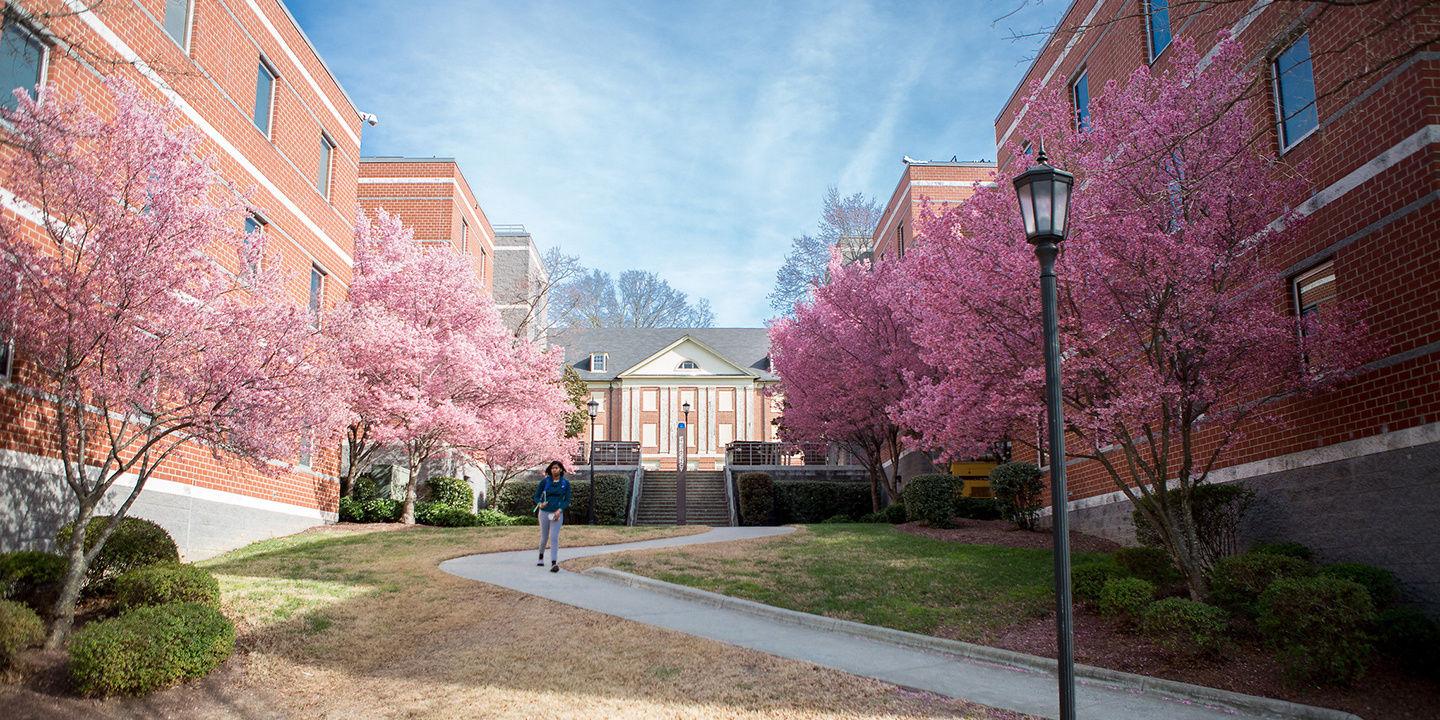
Financial Assistance
Types of Aid
Financial aid is available in the form of scholarships, grants, loans, and work study. The student must reapply each academic year for financial aid. The FAFSA is available on October 1 of each year.
Grants
- Federal Pell Grant: Awarded to students based on their expected family contribution (EFC) and enrollment status.
- Federal Supplemental Education Opportunity Grant: Campus-based federal grant awarded to students who receive a Pell Grant. Funds are distributed on a first-come, first-served basis. Limited funds are available.
- DC Tuition Assistance Grant (DC TAG): This grant pays the difference between in-state and out-of-state tuition and fees at any public college (up to $10,000 per year). Students must be enrolled in a degree-granting program at an eligible institution and be domiciled in the District of Columbia.
- DC College Access Program (DC-CAP): DC public and DC charter school graduates meeting eligibility criteria and enrolled in an accredited four-year university are eligible to apply for DC-CAP Last Dollar Awards, for up to $2,000 per year for five years.
State Grants
The State of North Carolina provides financial aid grant assistance to resident students. Priority is established by the FAFSA application completion date. Funds are limited. Please file the FAFSA as early as possible (on or after October 1 for the next academic year).
- UNC Campus-Based Scholarship: Established in 2002 by the General Assembly, this program was created through the consolidation of several existing programs to provide financial assistance to North Carolinians attending the state’s public universities. The UNC Campus Scholarship Program supports students across the 16 North Carolina public university campuses. A portion of the program is designated for American Indian/Native American students who can provide evidence of membership in an Indian tribe recognized by the State of North Carolina or the United States.
Institutional Need-Based Grants
NC Central invests resources in the form of institutional grants to support undergraduate students from the University’s own funds. These awards are based on financial need and offered on a first-come, first-served basis. The university offers the following institutional grants:
- NC Central Grant: An institutional grant awarded to NC undergraduate students. Priority is given to Pell Grant recipients. The NC Central Grant is based solely on financial need and offered on a first-come, first-served basis.
- NC Central Eagle Grant: An institutional grant awarded to NC undergraduate students. Priority is given to Pell Grant recipients. The NC Central Eagle Grant is based solely on financial need and offered on a first-come, first-served basis.
Loan Options for Undergraduate Students

- Federal Direct Subsidized Stafford Loans: A guaranteed student loan for undergraduates who are US citizens or permanent residents and who have demonstrated financial need as determined by federal regulations. The federal government provides limits on the amount in Direct Subsidized loans that a student may be eligible to receive in each academic year and in total. Limits vary based on the student’s year in school and financial need.
- Federal Direct Unsubsidized Stafford Loans: A guaranteed student loan for US citizens or permanent residents who do not show financial need under federal regulations. Direct Unsubsidized loans may also be available to undergraduates who have reached the borrowing limit for Direct Subsidized loans.
- Federal Direct Parent PLUS Loan: Loan for the parents of dependent undergraduate students. A credit check will be performed and will exclude anyone with an adverse credit history. Direct PLUS loan amounts are limited to the cost of attendance minus any other financial assistance received.
Loan Limits
| Year/Classification | Dependent Student (except students whose parents are unable to obtain PLUS Loan) | Independent Students (and dependent undergraduate students whose parents are unable to obtain PLUS Loans) |
|---|---|---|
| First-Year Undergraduate Annual Loan Limit | $5,500—No more than $3,500 of this amount may be in subsidized loans. | $9,500—No more than $3,500 of this amount may be in subsidized loans. |
| Second-Year Undergraduate Annual Loan Limit | $6,500—No more than $4,500 of this amount may be in subsidized loans. | $10,500—No more than $4,500 of this amount may be in subsidized loans. |
| Third-Year and Beyond Undergraduate Annual Loan Limit | $7,500—No more than $5,500 of this amount may be in subsidized loans. | $12,500—No more than $5,500 of this amount may be in subsidized loans. |
| Aggregate Loan Limit Total for Undergraduate Degree |
$31,000—No more than $23,000 of this amount may be in subsidized loans. | $57,500—No more than $23,000 of this amount may be in subsidized loans. |
Loan Options for Graduate/Professional Students
- Federal Direct Unsubsidized Stafford Loans: A guaranteed student loan for US citizens or permanent residents who do not show financial need under federal regulations.
- Federal Direct Graduate PLUS Loans: A credit-based loan for Graduate and Professional Students. A credit check will be performed and will exclude anyone with an adverse credit history. Direct PLUS loan amounts are limited to the cost of attendance minus any other financial assistance received.
Loan Limits for Graduate/Professional Students
| Graduate/Professional | Independent Students (all graduate and professional students are considered independent) |
|---|---|
| Graduate or Professional Students Annual Loan Limit | $20,500—Unsubsidized only |
| Aggregate Loan Limit Total for Graduate/Professional Degree Student |
$138,500—No more than $65,000 of this amount may be in prior subsidized loans. The graduate aggregate limit includes all federal loans received for undergraduate study. |
Cost of Attendance Increase Due to Computer Purchase
Summer School Financial Aid
 The process for summer school is a paperless application process:
The process for summer school is a paperless application process:
- You must be advised by your academic advisor and register for summer school in the sessions desired. Classes must appear in Banner. It is best to enter all classes at the same time.
- Registered students will be automatically awarded. Awards will be based on the registered session(s) (Summer I, II, or I and II) at the time the summer school award is processed. Students must view and accept Summer award offers using myEOL.
Note: Students with a prior bill or those who are studying abroad will need to complete a Summer School paper application by requesting one from the Office of Scholarships and Student Aid.
Approved Certificate Programs
Gain valuable skills and enhance your resume and career opportunities with a certificate program. Stand out to prospective employers or improve your prospects for advancement in your current position. A US Department of Education-approved certificate program is a convenient option for working professionals to stand out to prospective employers or improve their prospects for advancement in their current position.
| Program Name | CIP Code | Credits | Effective Date |
| UNDERGRADUATE APPROVED PROGRAMS | |||
| Cybersecurity Certificate | 11.0103 | 18 | 9/14/22 |
| Licensure-Only Undergraduate | 13.0101 | 30 | 9/14/22 |
| Uncrewed Aircraft Systems | 45.0702 | 15 | 9/14/22 |
| Undergraduate Residency Ed. Licensure | 24.0102 | 30 | 9/14/22 |
| GRADUATE AND PROFESSIONAL APPROVED PROGRAMS | |||
| Academically Gifted (Undergraduate) Add-On Licensure | 13.1005 | 12 | 9/14/22 |
| Assistive Technology for Individuals with Visual Impairment Certificate | 13.1009 | 18 | 9/14/22 |
| Civil Rights and Constitutional Law | 22.0101 | 8 | 9/14/22 |
| Clinical Research Sciences | 51.1099 | 12 | 9/14/22 |
| Dietetic Internship Program | 51.3101 | 10 | 9/14/22 |
| Dietetic Internship Program (DIP) | 19.0101 | 15 | 9/14/22 |
| Digital Librarianship | 25.0101 | 18 | 9/14/22 |
| Dispute Resolution | 22.0101 | 8 | 9/14/22 |
| E-Learning Certificate | 13.0501 | 18 | 9/14/22 |
| Equity Certificate Program | 13.0401 | 12 | 9/14/22 |
| Faith-Based and Philanthropic Entrepreneurship | 44.0401 | 12 | 9/14/22 |
| Family and Consumer Science, Concentration Teacher Education | 19.0101 | 81 | 9/14/22 |
| FEM Dietetics Certificate Online | 51.3101 | 10 | 9/14/22 |
| Geospatial Intelligence Certificate | 45.0702 | 18 | 9/14/22 |
| Global Security Studies | 13.1399 | 24 | 9/14/22 |
| Health Informatics | 11.0401 | 21 | 9/14/22 |
| Health Informatics | 51.2706 | 18 | 9/14/22 |
| Information Policy and Management | 11.0401 | 21 | 9/14/22 |
| Justice in the Practice of Law | 22.0101 | 8 | 9/14/22 |
| Licensure-Only Graduate | 13.0101 | 15 | 9/14/22 |
| Middle Level Education | 13.1202 | 93 | 9/14/22 |
| Non-Profit Management Certificate | 44.0401 | 12 | 9/14/22 |
| Post Baccalaureate Certificate in Orientation and Mobility | 13.1009 | 31 | 9/14/22 |
| Reading Add-On Licensure | 13.0301 | 25 | 9/14/22 |
| School Counseling | 13.1101 | 51 | 9/14/22 |
| Special Education | 13.1005 | 33 | 9/14/22 |
| Teaching Artist Certificate Program | 50.0901 | 16 | 9/14/22 |
| Tech Law and Policy Center | 22.0101 | 8 | 9/14/22 |
Not Approved Certificate Programs
The Department of Education did not approve the certificate programs listed below for financial aid. These programs are ineligible for grants, work-study and loans. Students may establish a payment plan with the Student Accounting Office.
| Program Name | CIP Code | Credits | Effective Date |
| NOT APPROVED UNDERGRADUATE PROGRAMS | |||
| Computer Information Systems | 11.0199 | 17 | 9/14/22 |
| Foodservice and Operations Management | 52.0901 | 13 | 9/14/22 |
| NOT APPROVED GRADUATE PROGRAMS | |||
| Biology, Concentration Teacher Education | 26.0101 | 107 | 9/14/22 |
| Birth - Kindergarten | 13.1209 | 71 | 9/14/22 |
| Chemistry, Concentration Teacher Education | 40.0501 | 107 | 9/14/22 |
| Educational Technology | 13.0501 | 39 | 9/14/22 |
| Elementary Education | 13.1202 | 78 | 9/14/22 |
| English as a Second Language (K-12) Add-On Licensure | 13.0301 | 28 | 9/14/22 |
| English, Concentration Teacher Education | 23.0101 | 81 | 9/14/22 |
| Faith-Based and Philanthropic Entrepreneurship-Accelerated | 44.0401 | 12 | 9/14/22 |
| Global Security Studies | 45.1001 | 24 | 9/14/22 |
| History, Concentration Teacher Education, Comprehensive Social Studies | 54.0101 | 81 | 9/14/22 |
| Mathematics, Concentration Teacher Education | 27.0101 | 91 | 9/14/22 |
| Middle Grades | 13.1203 | 93 | 9/14/22 |
| Music, Concentration Teacher Education | 50.0901 | 94 | 9/14/22 |
| Physical Education | 13.1314 | 78 | 9/14/22 |
| Physics, Concentration Teacher Education | 40.0801 | 107 | 9/14/22 |
| School Administrator Principal | 13.0409 | 42 | 9/14/22 |
| School Media Coordinator | 25.0101 | 12 | 9/14/22 |
| Spanish, Concentration Teacher Education | 16.0905 | 78 | 9/14/22 |
| Special Education - Visual Impairments | 13.1009 | 39 | 9/14/22 |
| Speech-Language Pathologist | 51.0201 | 60 | 9/14/22 |
| Theatre Arts, Concentration Teacher Education | 50.0501 | 87 | 9/14/22 |